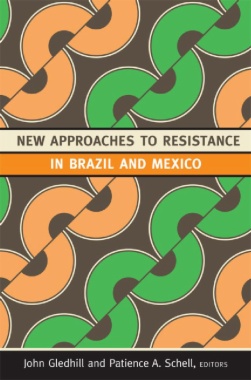Bringing together historically and ethnographically grounded studies of the social and political life of Brazil and Mexico, this collection of essays revitalizes resistance as an area of study. Resistance studies boomed in the 1980s and then was subject to a wave of critique in the 1990s. Covering the colonial period to the present day, the case studies in this collection suggest that, even if much of that critique was justified, resistance remains a useful analytic rubric. The collection has three sections, each of which is preceded by a short introduction. A section focused on religious institutions and movements is bracketed by one featuring historical studies from the sixteenth through the nineteenth centuries and another gathering more contemporary, ethnographically-based studies. Introducing the collection, the anthropologist John Gledhill traces the debates about resistance studies. In the conclusion, Alan Knight provides a historian’s perspective on the broader implications of the contributors’ findings.
Contributors. Helga Baitenmann, Marcus J. M. de Carvalho, Guillermo de la Peña, John Gledhill, Matthew Gutmann, Maria Gabriela Hita, Alan Knight, Ilka Boaventura Leite, Jean Meyer, John Monteiro, Luis Nicolau Parés, Patricia R. Pessar, Patience A. Schell, Robert Slenes, Juan Pedro Viqueira, Margarita Zárate
- Contents
- Acknowledgments
- Introduction: A Case for Rethinking Resistance
- Part One: Resistance and the Creation of New Worlds
- Chapter One: Rethinking Amerindian Resistance and Persistence in Colonial Portuguese America
- Chapter Two: Rituals of Defiance: Past Resistance, Present Ambiguity
- Chapter Three: Indian Resistances to the Rebellion of 1712 in Chiapas
- Chapter Four: The “Commander of All Forests” against the “Jacobins” of Brazil The Cabanada, 1832–1835
- Chapter Five: A “Great Arch” Descending Manumission Rates, Subaltern Social Mobility, and the Identities of Enslaved, Freeborn, and Freed Blacks in Southeastern Brazil, 1791–1888
- Part Two: Resisting through Religion and for Religion
- Chapter Six: Millenarianism, Hegemony, and Resistance in Brazil
- Chapter Seven: Where Does Resistance Hide in Contemporary Candomblé?
- Chapter Eight: Catholic Resistances in Revolutionary Mexico during the Religious Conflict
- Chapter Nine: Gender, Resistance, and Mexico’s Church-State Conflict
- Part Three: Rethinking Resistance in a Changing World
- Chapter Ten: Tracing Resistance Community and Ethnicity in a Peasant Organization
- Chapter Eleven: Resistance, Factionalism, and Ethnogenesis in Southern Jalisco
- Chapter Twelve: The Transhistorical, Juridical-Formal, and Post- Utopian Quilombo
- Chapter Thirteen: From Resistance Avenue to the Plaza of Decisions New Urban Actors in Salvador, Bahia
- Chapter Fourteen: Contestation in the Courts: The Amparo as a Form of Resistance to the Cancellation of Agrarian Reform in Mexico
- Chapter Fifteen: Beyond Resistance Raising Utopias from the Dead in Mexico City and Oaxaca
- Conclusion: Rethinking Histories of Resistance in Brazil and Mexico
- Bibliography
- About the Contributors
- Index

